
Robohub.org
Transport Canada relaxes commercial drone regulations, increases focus on academic use
Last week, Transport Canada announced upcoming changes to the regulatory framework surrounding drones. Transport Canada’s exemption notification simultaneously signals a relaxation of commercial drone regulations and an increased focus on academic use.As of the end of this month, commercial operators could benefit from two exemptions from the general Special Flight Operations Certificate (SFOC) requirement.
First, an SFOC will no longer be required for commercial operators flying UAVs under 2 kilograms. And second, commercial operators conducting low risk operations using UAVs under 25kg will also be exempt from the SFOC requirement. Transport Canada has yet to release information regarding the factors that will determine whether an operation falls into the parameters of the second exemption.
A closer look at the Transport Canada announcement suggests additional implications are on the horizon. Here is the relevant statement:
Until the new requirements come into effect, you must apply for a Special Flight Operations Certificate if:
- Your aircraft weighs more than 35 kilograms (77 pounds).
- You use your aircraft for work or academic purposes (such as aerial photography, geomatic surveying, crop observation, advertising, research and development).
The academic purposes concept seems to be a new addition to the SFOC requirement. Let’s trace the evolution of the terminology employed in determining whether an SFOC is required…
Transport Canada enforces the Canadian Aviation Regulations (CARs) and the Aeronautics Act. Subsection 101.01(1) of the CARs defines a UAV as a “power-driven aircraft, other than a model aircraft, that is designed to fly without a human operator on board.” Section 603.66 prohibits flying a UAV without complying with SFOC requirements.
Under the CARs, model aircraft means an aircraft weighing no more than 35kg that is mechanically driven or launched for recreational purposes. The CARs do not define “recreational purposes”. However, Transport Canada’s Staff Instruction No. 623-001 points to the definition in the Aeronautics Act which turns on whether there is hire and reward, which is defined as “any payment, consideration, gratuity or benefit, directly or indirectly charged, demanded, received or collected by any person for the use of an aircraft”.
 A few weeks ago, Transport Canada published an infographic on its website to assist UAV operators in determining whether they need to apply for an SFOC. The infographic states that if you are not using the UAV for “work” and it does not weigh more than 35kg, you do not need an SFOC – still no mention of academic purposes. It appears that the notice regarding the two upcoming exemptions might be the first instance of the academic purposes terminology.
A few weeks ago, Transport Canada published an infographic on its website to assist UAV operators in determining whether they need to apply for an SFOC. The infographic states that if you are not using the UAV for “work” and it does not weigh more than 35kg, you do not need an SFOC – still no mention of academic purposes. It appears that the notice regarding the two upcoming exemptions might be the first instance of the academic purposes terminology.
What are the implications of the new terminology? Without a definition of “academic purposes”, it is unclear how far reaching the effects of the terminology will be. Is the term meant to capture research and development activities taking place in academic institutions? Will it apply to student projects outside of research lab environments? Transport Canada will need to explain what is meant by “academic purposes” to ensure that UAV operators have clarity regarding the application of the SFOC requirements in academia.
tags: c-Aerial, Canada, cx-Politics-Law-Society, drone policy, drone regulation





